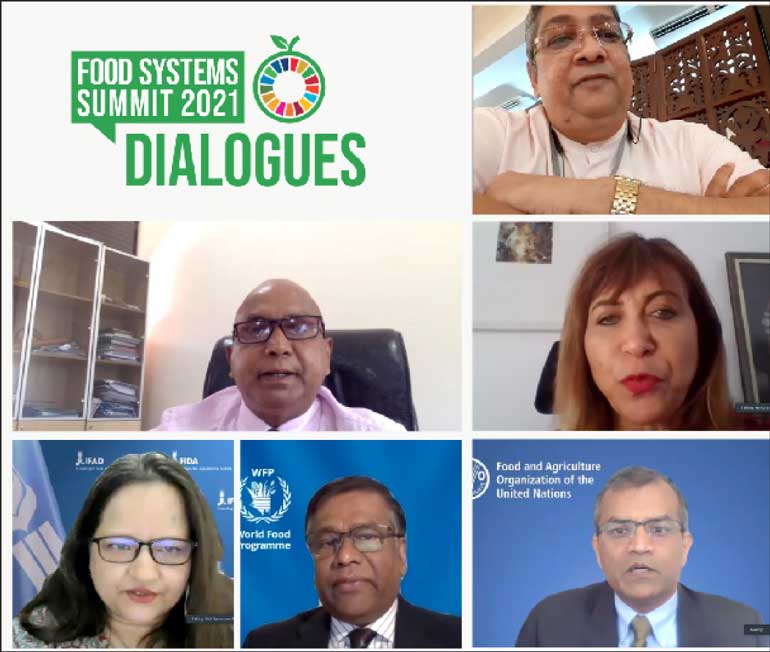Sunday Feb 15, 2026
Sunday Feb 15, 2026
Saturday, 19 June 2021 00:01 - - {{hitsCtrl.values.hits}}

Key panellists at the inaugural National Food Systems Dialogue: Ministry of Agriculture Secretary Prof. Udith Jayasinghe Mudalige, Ministry of Agriculture Additional Secretary (Technical) Dr. Ajantha De Silva, UN Resident Coordinator Hanaa Fikry Ahmed Singer, IFAD Country Director Sherina Tabassum, WFP Representative and Country Director Abdur Rahim Siddiqui, and FAO Representative Vimlendra Sharan
Key panellists at the inaugural National Food Systems Dialogue: Ministry of Agriculture Secretary Prof. Udith Jayasinghe Mudalige, Ministry of Agriculture Additional Secretary (Technical) Dr. Ajantha De Silva, UN Resident Coordinator Hanaa Fikry Ahmed Singer, IFAD Country Director Sherina Tabassum, WFP Representative and Country Director Abdur Rahim Siddiqui, and FAO Representative Vimlendra Sharan
The National Food Systems Dialogue was organised by the Ministry of Agriculture to identify challenges in building sustainable food systems in Sri Lanka, ranging from production, processing, distribution, consumption and disposal of food products.
Minister of Agriculture Mahindananda Aluthgamage in his message to the participants of the National Food System Dialogue stated that despite Sri Lanka achieving middle-income status, the country faces a triple burden of malnutrition spanning undernourishment, over-nourishment and micronutrient deficiencies. Noting that the agriculture sector is the main contributor of safe and nutritious food for all, the Minister reiterated the importance of transforming food systems to make it profitable and socially inclusive with positive impacts on the natural environment. So that food security and nutrition for future generations are not compromised.
Sri Lanka’s inaugural Food System Dialogue is part of a series of national and provincial dialogues conducted by the Ministry of Agriculture ahead of the 2021 UN Food System Summit set to take place in New York later this year.
The United Nations Resident Coordinator in Sri Lanka Hanaa Singer-Hamdy said: “The Summit convened by the Secretary General – part of the Decade of Action to achieve the Sustainable Development Goals by 2030 – is an opportunity for Member States to identify their own pathways to sustainable food systems and take the necessary action to address these unique challenges. The Summit offers a timely process for helping policy makers and food system actors to better understand the impacts of alternative courses of action and strengthen partnerships and our capacity for collective action.”
The National Food System Dialogue – a high-level virtual meeting of stakeholders from the Government, private sector, civil society organisations and development agencies – focused on the major challenges affecting the agri-food system in Sri Lanka. The dialogue explored collective actions that are needed to ensure access to safe and nutritious food for all, shift to sustainable consumption patterns, boost environment-friendly production, advance equitable livelihoods across the food systems and build resilience to vulnerabilities, shocks and stressors.
Food and Agriculture Organization (FAO) Representative Vimlendra Sharan spoke on the need for establishing policy measures and legal frameworks that support sustainable food systems while safeguarding natural resources. Calling for innovative solutions he said, “Solutions of yester-years can’t be the answers for tomorrow. The Food Systems Summit gives us an excellent opportunity to move on from paradigms of the past.”
The COVID-19 pandemic has revealed extreme inequities and inefficiencies in the food system which depend on thousands of food producers and processors, many of whom are living with very low incomes. The pandemic came at a time when food systems were already under strain from natural disasters such as floods and prolonged periods of drought, climate change, and the arrival of transboundary pests and diseases such as Fall Armyworm.
“The pandemic, despite all its ensuing turbulence, brought about remarkable learning opportunities, demonstrating the importance of preparedness in building resilient food systems,” says World Food Programme (WFP) Sri Lanka Representative and Country Director Abdur Rahim Siddiqui. “These national dialogues provide an excellent platform for collective action in reviewing our existing systems, evaluating our options and charting a clear path forward for better food security and nutrition for all.”
“The Food Systems Summit is an opportunity to make fundamental changes in food systems that would make them more equitable and sustainable. IFAD is proud to support the Government of Sri Lanka and work with relevant stakeholders to put smallholder farmers and other rural people at the heart of this process. Leveraging multi-stakeholder partnerships can transform food systems,” said International Fund for Agricultural Development (IFAD) Sri Lanka Country Director Sherina Tabassum.
The Food System Dialogues organised by the Government of Sri Lanka led by the Ministry of Agriculture is supported by the UN, FAO, WFP and IFAD. Independent dialogues are also being promoted for individuals and organisations to propose innovative pathways towards sustainable food systems.
The collective outcomes of the Food System Dialogues held in Sri Lanka will inform the UN Food System Summit which will launch bold new actions to deliver progress on all 17 Sustainable Development Goals (SDGs), each of which relies to some degree on healthier, more sustainable and equitable food systems.